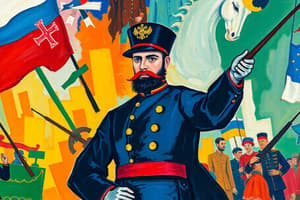Podcast
Questions and Answers
The Russian Army was poorly equipped and inadequately trained for ______.
The Russian Army was poorly equipped and inadequately trained for ______.
battle
Tsar Nicholas II faced public criticism for allowing ______'s influence over the royal family.
Tsar Nicholas II faced public criticism for allowing ______'s influence over the royal family.
Rasputin
The first revolution occurred in ______ 1917 in Petrograd.
The first revolution occurred in ______ 1917 in Petrograd.
February
The slogan 'Peace, bread and ______' was popularized by Lenin.
The slogan 'Peace, bread and ______' was popularized by Lenin.
On November 6th and 7th, 1917, the Bolsheviks launched a ______ against the Provisional Government.
On November 6th and 7th, 1917, the Bolsheviks launched a ______ against the Provisional Government.
After the revolution, the Bolshevik government exited World War I by signing the Treaty of ______-Litovsk.
After the revolution, the Bolshevik government exited World War I by signing the Treaty of ______-Litovsk.
A civil war erupted in 1918 between the Bolsheviks and the ______ Army.
A civil war erupted in 1918 between the Bolsheviks and the ______ Army.
The Petrograd Soviet was the city council for workers and ______.
The Petrograd Soviet was the city council for workers and ______.
Flashcards
Russian Revolution
Russian Revolution
A period of political and social upheaval in Russia that led to the overthrow of the Tsarist regime and the establishment of the Soviet Union.
Russia's role in World War I
Russia's role in World War I
The Russian Empire's involvement in World War I, which strained its resources and exacerbated internal tensions.
What factors contributed to the outbreak of the February Revolution in Russia?
What factors contributed to the outbreak of the February Revolution in Russia?
The catalyst for unrest and ultimately the February Revolution, these conditions included food shortages, growing political opposition, and the Tsar's unpopular decisions.
Bolshevik Revolution
Bolshevik Revolution
Signup and view all the flashcards
What did the Bolsheviks promise with the slogan "Peace, Bread and Land"?
What did the Bolsheviks promise with the slogan "Peace, Bread and Land"?
Signup and view all the flashcards
The Treaty of Brest-Litovsk
The Treaty of Brest-Litovsk
Signup and view all the flashcards
The Russian Civil War
The Russian Civil War
Signup and view all the flashcards
The White Army and the Red Army
The White Army and the Red Army
Signup and view all the flashcards
Study Notes
The Russian Revolution
- Russia was at war with Germany in World War I from 1914.
- Russia’s working class and peasantry formed the majority of the Russian Army.
- The Russian Army was poorly equipped and inadequately trained for battle.
- Millions of Russians were killed or wounded by 1917.
- Tsar Nicholas II faced public criticism for his role in the war and other issues, including:
- Taking personal command of the army.
- Allowing Rasputin's influence over the royal family.
- Food shortages.
- Growing political opposition.
- The first revolution occurred in February 1917 on the Julian calendar in Petrograd, the capital of Imperial Russia.
- Protesters demonstrated over food rationing and were joined by striking workers.
- The army was deployed to suppress the uprising, leading to the deaths of some protesters.
- Some soldiers refused to fire on the demonstrators.
- The army was in a state of mutiny against the Tsar.
- The Petrograd Soviet was the city council for workers and soldiers.
- The Tsar abdicated, ending the Tsarist autocracy and paving the way for a new government.
- This government was run by two political parties, the Petrograd Soviet and the Provisional Government.
The Bolshevik Revolution
- The Provisional Government was unpopular because it remained in World War I and failed to distribute land to peasants.
- Vladimir Lenin and the Bolsheviks, a faction of the Marxist Russian Social Democratic Labour Party, later became the Communist Party of the Soviet Union.
- Lenin advocated for "Peace, bread and land", a slogan to appeal to the people and the Petrograd Soviet.
- Peace: Ending Russia's involvement in World War I.
- Bread: Addressing food shortages.
- Land: Distributing land to the peasants
- Lenin proclaimed, "All power to the Soviets," intending to seize power in the name of the Soviet.
- On November 6th and 7th, 1917 (October 24th and 25th on the Julian calendar), the Bolsheviks launched a coup d'état against the Provisional Government, led by Lenin.
- They stormed the Winter Palace, arresting the Provisional Government and seizing control of Russia's government.
- After the revolution, the Bolshevik government exited World War I by signing the Treaty of Brest-Litovsk with Germany.
- A civil war erupted in 1918 between those who opposed the new Bolshevik government (the White Army) and the Bolsheviks (the Red Army).
Studying That Suits You
Use AI to generate personalized quizzes and flashcards to suit your learning preferences.




